- Home
- Alice Munro
The Love of a Good Woman Page 6
The Love of a Good Woman Read online
Page 6
In the little meadow between the house and the riverbank there were cows. She could hear them munching and jostling, feeding at night. She thought of their large gentle shapes in there with the money musk and chicory, the flowering grasses, and she thought, They have a lovely life, cows.
It ends, of course, in the slaughterhouse. The end is disaster.
For everybody, though, the same thing. Evil grabs us when we are sleeping; pain and disintegration lie in wait. Animal horrors, all worse than you can imagine beforehand. The comforts of bed and the cows’ breath, the pattern of the stars at night—all that can get turned on its head in an instant. And here she was, here was Enid, working her life away pretending it wasn’t so. Trying to ease people. Trying to be good. An angel of mercy, as her mother had said, with less and less irony as time went on. Patients and doctors, too, had said it.
And all the time how many thought that she was a fool? The people she spent her labors on might secretly despise her. Thinking they’d never do the same in her place. Never be fool enough. No.
Miserable offenders, came into her head. Miserable offenders.
Restore them that are penitent.
So she got up and went to work; as far as she was concerned, that was the best way to be penitent. She worked very quietly but steadily through the night, washing the cloudy glasses and sticky plates that were in the cupboards and establishing order where there was none before. None. Teacups had sat between the ketchup and the mustard and toilet paper on top of a pail of honey. There was no waxed paper or even newspaper laid out on the shelves. Brown sugar in the bag was as hard as rock. It was understandable that things should have gone downhill in the last few months, but it looked as if there had been no care, no organization here, ever. All the net curtains were gray with smoke and the windowpanes were greasy. The last bit of jam had been left to grow fuzz in the jar, and vile-smelling water that had held some ancient bouquet had never been dumped out of its jug. But this was a good house still, that scrubbing and painting could restore.
Though what could you do about the ugly brown paint that had been recently and sloppily applied to the front-room floor?
When she had a moment later in the day she pulled the weeds out of Rupert’s mother’s flower beds, dug up the burdocks and twitch grass that were smothering the valiant perennials.
She taught the children to hold their spoons properly and to say grace.
Thank you for the world so sweet,
Thank you for the food we eat …
She taught them to brush their teeth and after that to say their prayers.
“God bless Mama and Daddy and Enid and Aunt Olive and Uncle Clive and Princess Elizabeth and Margaret Rose.” After that each added the name of the other. They had been doing it for quite a while when Sylvie said, “What does it mean?”
Enid said, “What does what mean?”
“What does it mean ‘God bless’?”
ENID made eggnogs, not flavoring them even with vanilla, and fed them to Mrs. Quinn from a spoon. She fed her a little of the rich liquid at a time, and Mrs. Quinn was able to hold down what was given to her in small amounts. If she could not do that, Enid spooned out flat, lukewarm ginger ale.
The sunlight, or any light, was as hateful as noise to Mrs. Quinn by now. Enid had to hang thick quilts over the windows, even when the blinds were pulled down. With the fan shut off, as Mrs. Quinn demanded, the room became very hot, and sweat dripped from Enid’s forehead as she bent over the bed attending to the patient. Mrs. Quinn went into fits of shivering; she could never be warm enough.
“This is dragging out,” the doctor said. “It must be those milkshakes you’re giving her, keeping her going.”
“Eggnogs,” said Enid, as if it mattered.
Mrs. Quinn was often now too tired or weak to talk. Sometimes she lay in a stupor, with her breathing so faint and her pulse so lost and wandering that a person less experienced than Enid would have taken her for dead. But at other times she rallied, wanted the radio on, then wanted it off. She knew perfectly well who she was still, and who Enid was, and she sometimes seemed to be watching Enid with a speculative or inquiring look in her eyes. Color was long gone from her face and even from her lips, but her eyes looked greener than they had in the past—a milky, cloudy green. Enid tried to answer the look that was bent on her.
“Would you like me to get a priest to talk to you?”
Mrs. Quinn looked as if she wanted to spit.
“Do I look like a Mick?” she said.
“A minister?” said Enid. She knew this was the right thing to ask, but the spirit in which she asked it was not right—it was cold and faintly malicious.
No. This was not what Mrs. Quinn wanted. She grunted with displeasure. There was some energy in her still, and Enid had the feeling that she was building it up for a purpose. “Do you want to talk to your children?” she said, making herself speak compassionately and encouragingly. “Is that what you want?”
No.
“Your husband? Your husband will be here in a little while.”
Enid didn’t know that for sure. Rupert arrived so late some nights, after Mrs. Quinn had taken the final pills and gone to sleep. Then he sat with Enid. He always brought her the newspaper. He asked what she wrote in her notebooks—he noticed that there were two—and she told him. One for the doctor, with a record of blood pressure and pulse and temperature, a record of what was eaten, vomited, excreted, medicines taken, some general summing up of the patient’s condition. In the other notebook, for herself, she wrote many of the same things, though perhaps not so exactly, but she added details about the weather and what was happening all around. And things to remember.
“For instance, I wrote something down the other day,” she said. “Something that Lois said. Lois and Sylvie came in when Mrs. Green was here and Mrs. Green was mentioning how the berry bushes were growing along the lane and stretching across the road, and Lois said, ‘It’s like in “Sleeping Beauty.” ‘ Because I’d read them the story. I made a note of that.”
Rupert said, “I’ll have to get after those berry canes and cut them back.”
Enid got the impression that he was pleased by what Lois had said and by the fact that she had written it down, but it wasn’t possible for him to say so.
One night he told her that he would be away for a couple of days, at a stock auction. He had asked the doctor if it was all right, and the doctor had said to go ahead.
That night he had come before the last pills were given, and Enid supposed that he was making a point of seeing his wife awake before that little time away. She told him to go right into Mrs. Quinn’s room, and he did, and shut the door after him. Enid picked up the paper and thought of going upstairs to read it, but the children probably weren’t asleep yet; they would find excuses for calling her in. She could go out on the porch, but there were mosquitoes at this time of day, especially after a rain like the afternoon’s.
She was afraid of overhearing some intimacy or perhaps the suggestion of a fight, then having to face him when he came out. Mrs. Quinn was building up to a display—of that Enid felt sure. And before she made up her mind where to go she did overhear something. Not the recriminations or (if it was possible) the endearments, or perhaps even weeping, that she had been half expecting, but a laugh. She heard Mrs. Quinn weakly laughing, and the laughter had the mockery and satisfaction in it that Enid had heard before but also something she hadn’t heard before, not in her life—something deliberately vile. She didn’t move, though she should have, and she was at the table still, she was still there staring at the door of the room, when he came out a moment later. He didn’t avoid her eyes—or she his. She couldn’t. Yet she couldn’t have said for sure that he saw her. He just looked at her and went on outside. He looked as if he had caught hold of an electric wire and begged pardon—who of?—that his body was given over to this stupid catastrophe.
The next day Mrs. Quinn’s strength came flooding back, in that unnatural and d
eceptive way that Enid had seen once or twice in others. Mrs. Quinn wanted to sit up against the pillows. She wanted the fan turned on.
Enid said, “What a good idea.”
“I could tell you something you wouldn’t believe,” Mrs. Quinn said.
“People tell me lots of things,” said Enid.
“Sure. Lies,” Mrs. Quinn said. “I bet it’s all lies. You know Mr. Willens was right here in this room?”
III. MISTAKE
MRS. QUINN had been sitting in the rocker getting her eyes examined and Mr. Willens had been close up in front of her with the thing up to her eyes, and neither one of them heard Rupert come in, because he was supposed to be cutting wood down by the river. But he had sneaked back. He sneaked back through the kitchen not making any noise—he must have seen Mr. Willens’s car outside before he did that—then he opened the door to this room just easy, till he saw Mr. Willens there on his knees holding the thing up to her eye and he had the other hand on her leg to keep his balance. He had grabbed her leg to keep his balance and her skirt got scrunched up and her leg showed bare, but that was all there was to it and she couldn’t do a thing about it, she had to concentrate on keeping still.
So Rupert got in the room without either of them hearing him come in and then he just gave one jump and landed on Mr. Willens like a bolt of lightning and Mr. Willens couldn’t get up or turn around, he was down before he knew it. Rupert banged his head up and down on the floor, Rupert banged the life out of him, and she jumped up so fast the chair went over and Mr. Willens’s box where he kept his eye things got knocked over and all the things flew out of it. Rupert just walloped him, and maybe he hit the leg of the stove, she didn’t know what. She thought, It’s me next. But she couldn’t get round them to run out of the room. And then she saw Rupert wasn’t going to go for her after all. He was out of wind and he just set the chair up and sat down in it. She went to Mr. Willens then and hauled him around, as heavy as he was, to get him right side up. His eyes were not quite open, not shut either, and there was dribble coming out of his mouth. But no skin broke on his face or bruise you could see—maybe it wouldn’t have come up yet. The stuff coming out of his mouth didn’t even look like blood. It was pink stuff, and if you wanted to know what it looked like it looked exactly like when the froth comes up when you’re boiling the strawberries to make jam. Bright pink. It was smeared over his face from when Rupert had him facedown. He made a sound, too, when she was turning him over. Glug-glug. That was all there was to it. Glug-glug and he was laid out like a stone.
Rupert jumped out of the chair so it was still rocking, and he started picking up all the things and putting each one back where it went in Mr. Willens’s box. Getting everything fitted in the way it should go. Wasting the time that way. It was a special box lined with red plush and a place in it for each one of his things that he used and you had to get everything in right or the top wouldn’t go down. Rupert got it so the top went on and then he just sat down in the chair again and started pounding on his knees.
On the table there was one of those good-for-nothing cloths, it was a souvenir of when Rupert’s mother and father went up north to see the Dionne Quintuplets. She took it off the table and wrapped it around Mr. Willens’s head to soak up the pink stuff and so they wouldn’t have to keep on looking at him.
Rupert kept banging his big flat hands. She said, Rupert, we got to bury him somewhere.
Rupert just looked at her, like to say, Why?
She said they could bury him down in the cellar, which had a dirt floor.
“That’s right,” said Rupert. “Where are we going to bury his car?”
She said they could put it in the barn and cover it up with hay.
He said too many people came poking around the barn.
Then she thought, Put him in the river. She thought of him sitting in his car right under the water. It came to her like a picture. Rupert didn’t say anything at first, so she went into the kitchen and got some water and cleaned Mr. Willens up so he wouldn’t dribble on anything. The goo was not coming up in his mouth anymore. She got his keys, which were in his pocket. She could feel, through the cloth of his pants, the fat of his leg still warm.
She said to Rupert, Get moving.
He took the keys.
They hoisted Mr. Willens up, she by the feet and Rupert by the head, and he weighed a ton. He was like lead. But as she carried him one of his shoes kind of kicked her between the legs, and she thought, There you are, you’re still at it, you horny old devil. Even his dead old foot giving her the nudge. Not that she ever let him do anything, but he was always ready to get a grab if he could. Like grabbing her leg up under her skirt when he had the thing to her eye and she couldn’t stop him and Rupert had to come sneaking in and get the wrong idea.
Over the doorsill and through the kitchen and across the porch and down the porch steps. All clear. But it was a windy day, and, first thing, the wind blew away the cloth she had wrapped over Mr. Willens’s face.
Their yard couldn’t be seen from the road, that was lucky. Just the peak of the roof and the upstairs window. Mr. Willens’s car couldn’t be seen.
Rupert had thought up the rest of what to do. Take him to Jutland, where it was deep water and the track going all the way back and it could look like he just drove in from the road and mistook his way. Like he turned off on the Jutland road, maybe it was dark and he just drove into the water before he knew where he was at. Like he just made a mistake.
He did. Mr. Willens certainly did make a mistake.
The trouble was it meant driving out their lane and along the road to the Jutland turn. But nobody lived down there and it was a dead end after the Jutland turn, so just the half mile or so to pray you never met anybody. Then Rupert would get Mr. Willens over in the driver’s seat and push the car right off down the bank into the water. Push the whole works down into the pond. It was going to be a job to do that, but Rupert at least was a strong bugger. If he hadn’t been so strong they wouldn’t have been in this mess in the first place.
Rupert had a little trouble getting the car started because he had never driven one like that, but he did, and got turned around and drove off down the lane with Mr. Willens kind of bumping over against him. He had put Mr. Willens’s hat on his head—the hat that had been sitting on the seat of the car.
Why take his hat off before he came into the house? Not just to be polite but so he could easier get a clutch on her and kiss her. If you could call that kissing, all that pushing up against her with the box still in one hand and the other grabbing on, and sucking away at her with his dribbly old mouth. Sucking and chewing away at her lips and her tongue and pushing himself up at her and the corner of the box sticking into her and digging her behind. She was so surprised and he got such a hold she didn’t know how to get out of it. Pushing and sucking and dribbling and digging into her and hurting her all at the same time. He was a dirty old brute.
She went and got the Quintuplets cloth where it had blown onto the fence. She looked hard for blood on the steps or any mess on the porch or through the kitchen, but all she found was in the front room, also some on her shoes. She scrubbed up what was on the floor and scrubbed her shoes, which she took off, and not till she had all that done did she see a smear right down her front. How did she come by that? And the same time she saw it she heard a noise that turned her to stone. She heard a car and it was a car she didn’t know and it was coming down the lane.
She looked through the net curtain and sure enough. A new-looking car and dark green. Her smeared-down front and shoes off and the floor wet. She moved back where she couldn’t be seen, but she couldn’t think of where to hide. The car stopped and a car door opened, but the engine didn’t cut off. She heard the door shut and then the car turned around and she heard the sound of it driving back up the lane. And she heard Lois and Sylvie on the porch.
It was the teacher’s boyfriend’s car. He picked up the teacher every Friday afternoon, and this was a Friday. So
the teacher said to him, Why don’t we give these ones a lift home, they’re the littlest and they got the farthest to go and it looks like it’s going to rain.
It did rain, too. It had started by the time Rupert got back, walking home along the riverbank. She said, A good thing, it’ll muddy up your tracks where you went to push it over. He said he’d took his shoes off and worked in his sock feet. So you must have got your brains going again, she said.
Instead of trying to soak the stuff out of that souvenir cloth or the blouse she had on, she decided to burn the both of them in the stove. They made a horrible smell and the smell made her sick. That was the whole beginning of her being sick. That and the paint. After she cleaned up the floor, she could still see where she thought there was a stain, so she got the brown paint left over from when Rupert painted the steps and she painted over the whole floor. That started her throwing up, leaning over and breathing in that paint. And the pains in her back—that was the start of them, too.
After she got the floor painted she just about quit going into the front room. But one day she thought she had better put some other cloth on that table. It would make things look more normal. If she didn’t, then her sister-in-law was sure to come nosing around and say, Where’s that cloth Mom and Dad brought back the time they went to see the Quints? If she had a different cloth on she could say, Oh, I just felt like a change. But no cloth would look funny.
So she got a cloth Rupert’s mother had embroidered with flower baskets and took it in there and she could still smell the smell. And there on the table was sitting the dark-red box with Mr. Willens’s things in it and his name on it and it had been sitting there all the time. She didn’t even remember putting it there or seeing Rupert put it there. She had forgot all about it.

 Runaway
Runaway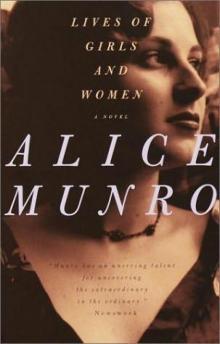 Lives of Girls and Women
Lives of Girls and Women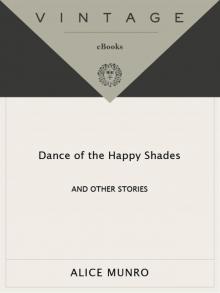 Dance of the Happy Shades
Dance of the Happy Shades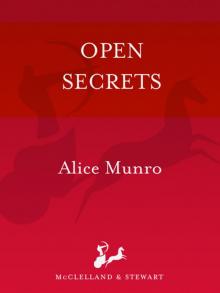 Open Secrets
Open Secrets Julieta (Movie Tie-in Edition)
Julieta (Movie Tie-in Edition)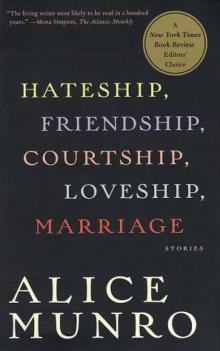 Hateship, Friendship, Courtship, Loveship, Marriage: Stories
Hateship, Friendship, Courtship, Loveship, Marriage: Stories Alice Munro's Best
Alice Munro's Best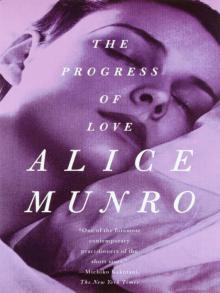 The Progress of Love
The Progress of Love Selected Stories
Selected Stories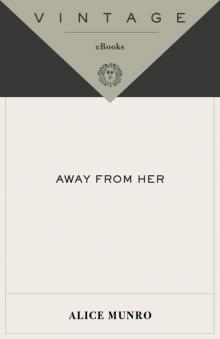 Away from Her
Away from Her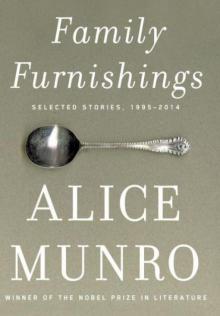 Family Furnishings
Family Furnishings Moons of Jupiter
Moons of Jupiter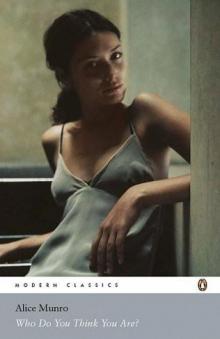 Who Do You Think You Are?
Who Do You Think You Are?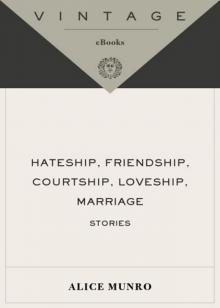 Hateship, Friendship, Courtship, Loveship, Marriage
Hateship, Friendship, Courtship, Loveship, Marriage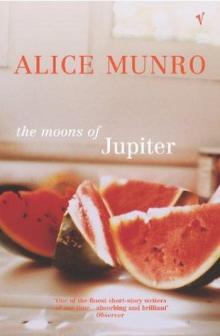 The Moons of Jupiter
The Moons of Jupiter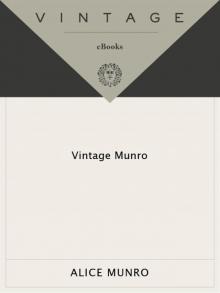 Vintage Munro
Vintage Munro The Love of a Good Woman
The Love of a Good Woman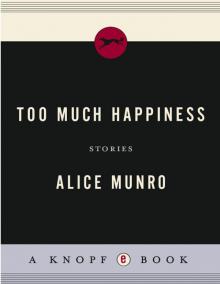 Too Much Happiness
Too Much Happiness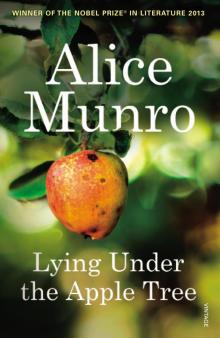 Lying Under the Apple Tree
Lying Under the Apple Tree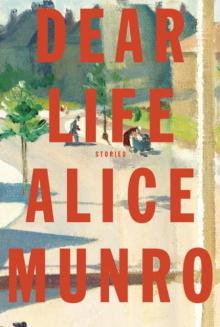 Dear Life
Dear Life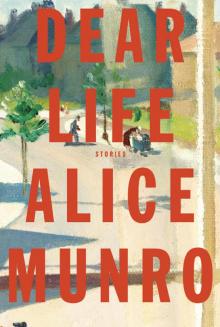 Dear Life: Stories
Dear Life: Stories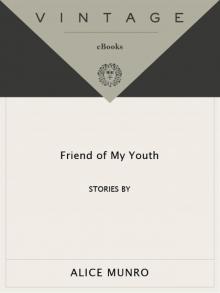 Friend of My Youth
Friend of My Youth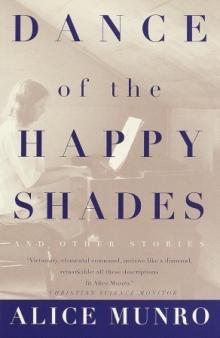 Dance of the Happy Shades: And Other Stories
Dance of the Happy Shades: And Other Stories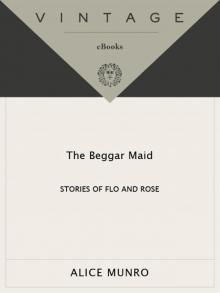 The Beggar Maid
The Beggar Maid